If you’re thinking about buying a 5th wheel trailer hitch, or are just curious about what they are, you’ve come to the right place.
This comprehensive guide will teach you everything you need to know about 5th wheel hitches, from their history to how they work.
We answered 66 most common questions about the 5th wheel hitch, which will defiantly answer your questions and save you time. So, check them out now!
What Is A 5th Wheel Hitch?
A fifth wheel hitch is a type of trailer hitch that is typically used for larger trailers, such as RVs.
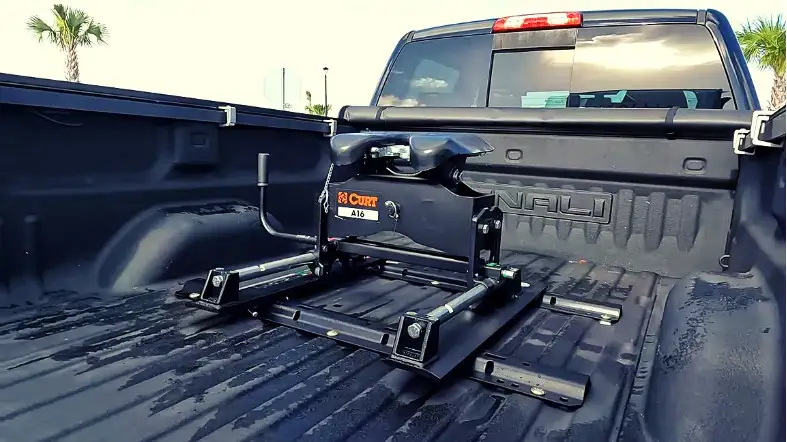
It attaches to the bed of a pickup truck and provides a connection point for the trailer’s kingpin.
How Does a 5th Wheel Hitch Work?
A fifth wheel hitch works by attaching to the bed of a pickup truck and providing a connection point for the trailer’s kingpin.
The hitch uses a plate that mounts to the frame of the truck and has a coupling device that secures the trailer in place.
If you have ever seen a large RV or camper trailer being towed down the road, you may have noticed that it is attached to the back of the truck in a different way than a regular trailer.
That’s because most RVs and campers are equipped with a fifth wheel hitch, which allows for a much more stable towing experience.
So, how does a fifth wheel hitch work?
Essentially, it consists of two parts:
the base plate that mounts to the truck’s frame, and the hitch head that attaches to the trailer.
The base plate has a kingpin coupler that mates with a receiver in the hitch head, and this connection point is what provides the stability that is so important when towing a large trailer.
What Are The Different Types Of 5th Wheel Hitches?
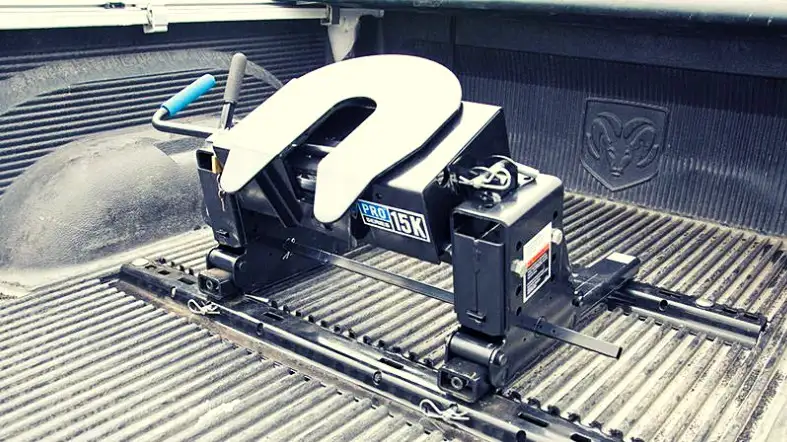
Here are some of the different types of 5th wheel hitches:
1. Gooseneck Fifth Wheel Hitch
2. Slider Fifth Wheel Hitch
3. Fixed Position Fifth Wheel Hitch
4. Plate Fifth Wheel Hitch
5. Sidewinder Fifth Wheel Hitch
6. Rail Fifth Wheel Hitch
Gooseneck Fifth Wheel Hitch
The gooseneck fifth wheel hitch is designed for use with gooseneck trailers.
This type of hitch mounts to the truck bed and extends over the cab, providing a tight connection between the truck and trailer.
Gooseneck hitches provide excellent towing stability and are ideal for use with larger trailers.
Slider Fifth Wheel Hitch
The Slider Fifth Wheel Hitch is designed for short-bed trucks and allows for clearance when making sharp turns.
It includes a locking mechanism and an easy-to-use handle for quick release.
Fixed Position Fifth Wheel Hitch
This type of hitch is designed to be bolted into place in the bed of a pickup truck.
It is a very strong and sturdy hitch, which is why it is so popular for heavy duty towing.
One advantage of the fixed position fifth wheel hitch is that it does not require any drilling or welding to install.
This makes it much easier to install than some of the other types of hitches.
Another advantage is that it provides a very tight connection between the trailer and the truck, which helps to prevent wobbling and shifting during travel.
The main downside of the fixed position fifth wheel hitch is that it is not as easily removed as some of the other types.
This can make it a bit more difficult to switch between trailers or to use the truck for other purposes when not towing.
Plate Fifth Wheel Hitch
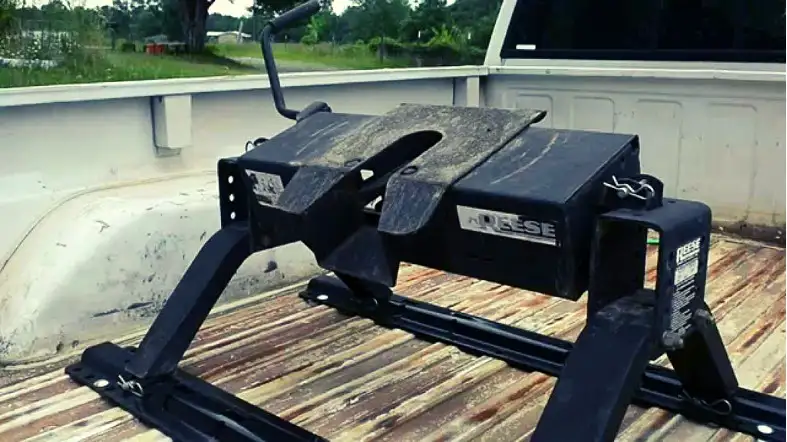
The plate fifth wheel hitch is very similar to the fixed position hitch, but it does have a few key differences.
One of the biggest differences is that the plate hitch is not bolted into place.
Instead, it uses a large plate that sits on top of the bed of the truck.
One advantage of the plate fifth wheel hitch is that it can be easily removed when not in use.
This makes it much more versatile than the fixed position hitch.
Another advantage is that it is generally easier to install since no drilling or welding is required.
The main downside of the plate fifth wheel hitch is that it can be less stable than the fixed position hitch.
This is because the plate can sometimes shift during travel, which can cause the trailer to wobble.
Sidewinder Fifth Wheel Hitch
Sidewinder hitches offer a number of advantages over traditional fifth wheel hitches.
First, they allow for greater maneuverability when making tight turns.
This can be a real advantage when you’re trying to maneuver into a tight spot or when you’re making a sharp turn while towing a heavy trailer.
Another advantage of sidewinder hitches is that they distribute weight more evenly between the tow vehicle and the trailer.
This can help to improve stability and prevent swaying, especially in windy conditions.
Finally, sidewinder hitches are typically easier to install and remove than traditional fifth wheel hitches.
This can be a real advantage if you frequently switch between different trailers or if you need to remove the hitch for storage.
If you’re looking for greater maneuverability, improved stability, and easy installation, then a sidewinder fifth wheel hitch may be the right choice for you.
Rail Fifth Wheel Hitch
The rail fifth wheel hitch is the most popular type of hitch for many truck owners.
It uses a system of rails that are installed in the bed of the truck.
These rails provide a very strong and stable connection between the truck and the trailer.
What Size Of 5th Wheel Hitch Do I Need?
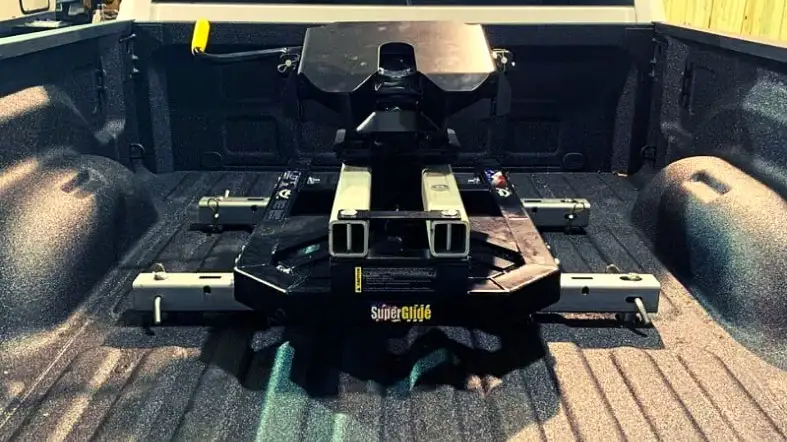
In general, you will need a fifth wheel hitch that is rated for at least 1,000 lbs. more than the trailer you are towing.
For example, if you are towing a 10,000 lb. trailer, you will need a hitch that is rated for at least 11,000 lbs.
There are many factors to consider when choosing a fifth wheel hitch, including the weight of your trailer, the type of vehicle you will be using to tow, and the features you are looking for.
Do I need a slider fifth wheel hitch?
If you plan on doing a lot of towing with your fifth wheel, then you might want to consider getting a slider hitch.
This type of hitch allows for more maneuverability when making tight turns, which can come in handy when navigating crowded areas or tight spaces.
There are a few things to keep in mind if you’re considering a slider hitch.
First, they typically cost more than a non-sliding hitch.
Second, they can be more difficult to install, so you might want to enlist the help of a professional if you go this route.
How Much Does a 5th Wheel Hitch Cost?
The cost of a fifth wheel hitch can vary depending on the make and model of the hitch, as well as who is performing the installation.
Generally speaking, most fifth wheel hitches will cost between $750 and $1700 to install from a qualified shop or installer.
This price may increase depending on the complexity of the installation, as well as the cost of the hitch itself.
If you plan on performing the installation yourself, you can expect to spend between $350 and $1200 on the hitch and installation/rail kit.
Keep in mind that this price may increase if you do not have all of the necessary tools for the job.
Where Can I Buy a 5th Wheel Hitch?
There are a few places you can buy a 5th wheel hitch.
1. Online retailers such as Amazon.com or Overstock.com
2. Auto parts stores such as AutoZone or O’Reilly’s Auto Parts
3. RV dealerships or accessory stores
4. Hitch installation companies such as U-Haul or The Hitch House
5. Craigslist or other online classifieds websites.
How Do I Choose The Right Fifth Wheel Hitch For My Vehicle?
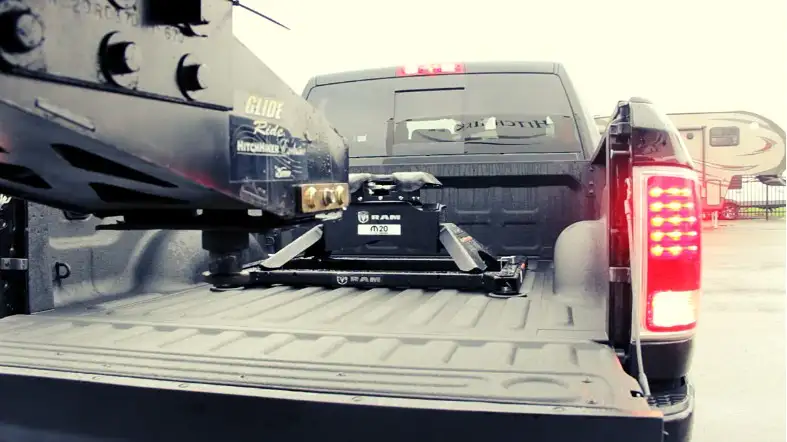
There are a few things you need to consider when choosing a fifth wheel hitch for your vehicle.
1. Determine the towing capacity of your vehicle.
2. Consider the type of terrain you’ll be traveling on.
3. Factor in the weight of your trailer.
4. Take into account the length of your trailer.
5. Keep width in mind when selecting a fifth wheel hitch.
6. Pay attention to the height of your trailer.
7. Check the tongue weight of your trailer.
8. Find out the pin weight of the hitch.
9. Make sure the hitch is compatible with a sway control device if needed.
10. Choose a hitch that is compatible with your brake controller.
11. Keep overall height and clearance in mind for your vehicle.
What Are the Benefits of Using a Fifth Wheel Hitch?
Here are some of the advantages to using a fifth wheel hitch:
1. Increased towing capacity
2. Improved stability
3. Greater control over the trailer
4. More convenient hitching and unhitching
5. Enhanced safety features
6. Smoother ride
7. Increased fuel efficiency
8. Greater versatility
Can I Use a Fifth Wheel Hitch with Any Truck?
A fifth wheel hitch is a specialized towing device that is designed for use with larger trucks, such as semi-trucks.
However, many people who own pickup trucks also use fifth wheel hitches for towing trailers, campers, and other large vehicles.
While a fifth wheel hitch can be used with any truck, it is important to make sure that the truck is properly equipped to handle the weight and size of the trailer or other vehicle that will be towed.
Otherwise, serious damage to the truck and/or trailer could occur.
How Do I Install a Fifth Wheel Hitch?
Here are the steps to install a fifth wheel hitch:
1. Read the instructions that come with the hitch carefully before beginning the installation process.
2. Park the truck on level ground and set the emergency brake.
3. Disconnect the battery to avoid any accidents while working around electrical wiring.
4. Raise the bed of the truck using a jack and support it with jack stands.
5. Remove the bolts that hold the spare tire in place.
6. Take out the bolts that secure the truck’s bumper to the frame.
7. Detach the wiring harness from the back of the truck.
8. Lower the jack slowly until the bed of the truck is resting on the jack stands.
9. Position the fifth wheel hitch in the bed of the truck.
10. Align the holes in the hitch with the holes in the frame of the truck.
11. Insert bolts through the holes and tighten them to secure the hitch in place.
12. Reconnect the wiring harness to the back of the truck.
13. Raise the bed of the truck and remove the jack stands.
14. Replace the bolts that hold the spare tire in place.
15. Lower the bed of the truck and reconnect the battery.
16. Test the hitch by attaching a trailer and making sure everything is secure before hitting the road.
Do I Need to Remove my Tailgate to Install a 5th Wheel Hitch?
No, you typically do not need to remove your tailgate to install a 5th wheel hitch.
Most 5th wheel hitches mount using the same holes in your truck frame that are used for mounting a gooseneck hitch.
If you have a short bed truck, you may need to remove your tailgate to give yourself enough clearance to maneuver the hitch into place.
Can I Adjust the Height of my 5th Wheel Hitch?
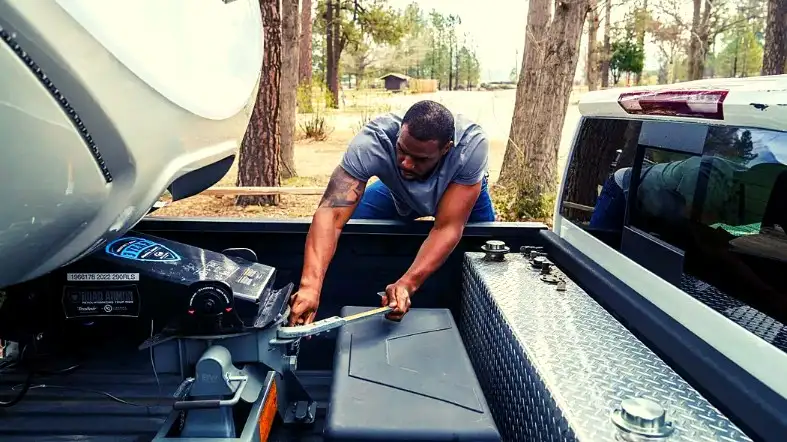
Yes, you can adjust the height of your 5th wheel hitch. There are a few different ways to do this, depending on the type of hitch you have.
If you have a bolt-on style hitch, you can simply loosen or tighten the bolts that attach it to your truck bed.
This will raise or lower the hitch, and adjust the height accordingly.
If you have a slide-in style hitch, you may need to adjust the height of the rails that the hitch sits on.
How Do I Maintain My Fifth Wheel Hitch?
To keep your fifth wheel hitch in good condition, you should regularly inspect it and clean it as needed.
You should also grease the moving parts of the hitch to prevent rust and corrosion.
If you notice any damage, have the hitch repaired or replaced as soon as possible. With proper care, your fifth wheel hitch will last for many years.
What is a 5th wheel hitch puck system?
A 5th wheel hitch puck system is a type of hitch used to tow a fifth-wheel trailer.
It typically consists of a metal plate that mounts to the bed of a truck and a kingpin that couples the trailer to the hitch.
The advantage of using a 5th wheel hitch puck system is that it allows for a tighter turning radius than a traditional hitch, making it ideal for use in tight spaces.
Can I Use a Fifth Wheel Hitch with a Travel Trailer?
Yes, you can use a fifth wheel hitch with a travel trailer.
The two types of hitches are very similar, and the process for attaching them is the same.
The main difference is that a fifth wheel hitch has a larger plate that sits over the trailer’s axle, providing more stability and weight distribution.
Can I Use a Fifth Wheel Hitch with an RV?
Yes, you can use a fifth wheel hitch with an RV.
However, you will need to make sure that the hitch is properly installed and that the RV is properly equipped to tow a fifth wheel trailer.
You should also be aware of the weight limitations of your RV and make sure that you do not exceed them when towing a fifth wheel trailer.
Can You Put A 5th Wheel Hitch On A Flatbed?
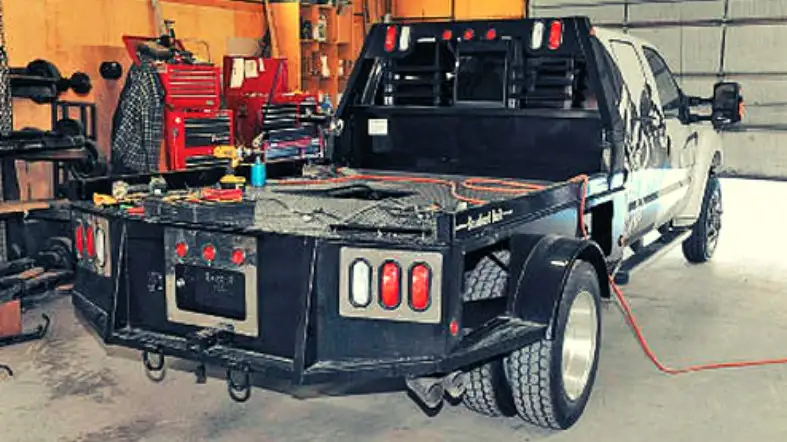
If you have a flatbed trailer, you may be wondering if you can install a 5th wheel hitch.
The answer is yes, but there are a few things to keep in mind.
First, you’ll need to make sure that the hitch is compatible with your particular flatbed trailer.
Second, you’ll need to reinforce the frame of the trailer to support the weight of the 5th wheel hitch.
And finally, you’ll need to make sure that the hitch is properly secured to the flatbed.
What are Some Safety Precautions I Should Take when Using a Fifth Wheel Hitch?
When using a fifth wheel hitch, there are a few safety precautions that you should take in order to ensure a safe and smooth experience.
First, always make sure that the kingpin is properly locked into place before starting to tow.
If the kingpin isn’t locked in, it could come loose and cause serious damage or even an accident.
Second, pay close attention to your surroundings and be aware of any low hanging branches or other obstacles that could potentially damage your RV or trailer.
Finally, always make sure to come to a complete stop before attempting to disconnect the fifth wheel hitch.
Failure to do so could result in serious injury.
By following these simple safety precautions, you can help ensure a safe and enjoyable experience when using a fifth wheel hitch.
What Are Some Common Features of Fifth Wheel Hitches?
There are several different types of fifth wheel hitches available on the market, but they all share some common features.
First, they all have a king pin that couples the hitch to the trailer.
This pin is generally located in the center of the hitch, and it is what allows the trailer to rotate around the hitch.
Second, fifth wheel hitches typically have a higher weight capacity than other types of hitches.
This is because they distribute the weight of the trailer more evenly across the hitch, which helps to prevent damage to the hitch itself.
Third, fifth wheel hitches usually have a higher tongue weight capacity than other types of hitches.
This is because they are designed to support the weight of the trailer’s tongue, which can be quite heavy.
Fourth, fifth wheel hitches typically offer a smoother ride than other types of hitches.
This is because they allow the trailer to rotate around the hitch, which helps to distribute the weight of the trailer more evenly.
Finally, fifth wheel hitches are generally easier to install and remove than other types of hitches.
This is because they do not require as much disassembly of the vehicle in order to install or remove them.
What Are Some Accessories I Can Use With My Fifth Wheel Hitch?
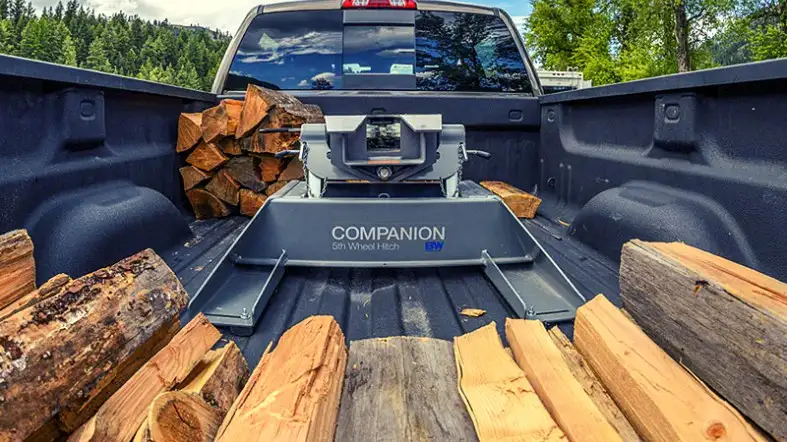
If you have a fifth wheel hitch, there are a few different accessories that can be used in order to make hitching and towing easier.
One such accessory is a fifth wheel hitch extension.
This can be helpful if you need extra clearance between your trailer and your truck bed.
It can also be useful if you need to make sharp turns while backing up.
Another accessory that can be used with a fifth wheel hitch is a sway control kit.
This can help to keep your trailer from swinging from side to side while you are driving.
Sway control kits typically include brackets and chains that attach to the frame of your trailer and your hitch.
If you will be doing a lot of highway driving with your fifth wheel trailer, you may want to consider investing in a set of airbags.
Airbags can help to level out your rig and prevent it from bouncing around while you are driving.
They attach to your hitch and inflate or deflate as needed.
Finally, if you will be doing any off-road driving with your fifth wheel trailer, you may want to invest in a set of mud flaps.
Mud flaps help to protect your trailer from rocks and other debris that could be kicked up by the tires.
They also help to keep your trailer clean if you happen to drive through any mud or water.
How Much Weight Can a Fifth Wheel Hitch Safely Handle?
There is no definitive answer to this question as it depends on a number of factors, such as the type and quality of the hitch, the weight capacity of your vehicle, and the conditions of the road.
However, as a general rule of thumb, a fifth wheel hitch should be able to safely handle a load of up to 24,000 pounds.
What Happens if I Overload my Fifth Wheel Hitch?
If you overload your fifth wheel hitch, it can cause a number of problems.
The most serious potential problem is that the extra weight could cause the hitch to fail, which could lead to your trailer becoming detached from your truck.
This could result in an accident.
Other potential problems associated with overloading a fifth wheel hitch include reduced maneuverability and braking ability, as well as increased wear and tear on the hitch itself.
If you regularly overload your hitch, it is likely to require more frequent servicing and may not last as long as it would otherwise.
To avoid these problems, always make sure that your fifth wheel hitch is properly rated for the weight of your trailer.
Do not exceed the maximum weight capacity of the hitch, and if you are carrying a particularly heavy load, make sure to distribute the weight evenly.
Will a Fifth Wheel Hitch Fit in My Garage?
A fifth wheel hitch is a large and often heavy piece of equipment, so it’s important to make sure that it will fit in your garage before purchasing one.
Fortunately, there are a few things you can do to ensure that your fifth wheel hitch will fit comfortably in your garage.
First, measure the dimensions of your garage door to see how much clearance you have.
Then, take a look at the dimensions of the fifth wheel hitch itself and compare it to the available space.
There are a few things to keep in mind when measuring for a fifth wheel hitch, such as the height of the hitch and the length of the arms.
How Do I Remove my Fifth Wheel Hitch?
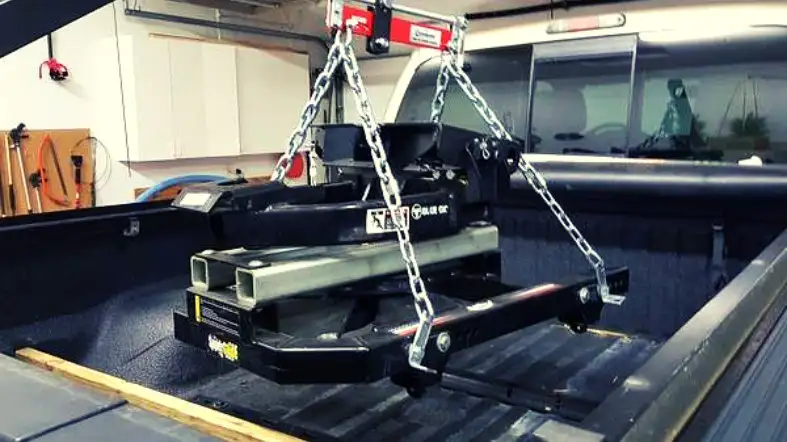
If you’re not using your fifth wheel hitch, you may want to remove it to free up some space. Here’s how to do it:
1. Park your trailer on level ground and set the parking brakes.
2. Disconnect the wiring harness from the trailer.
3. Disengage the locking mechanism on the hitch head.
4. Unhook the safety chains from the hitch head.
5. Raise the landing legs on your trailer so that they are fully extended.
6. Remove the pins that secure the fifth wheel hitch to your trailer’s frame.
7. Lower the landing legs on your trailer and move it forward until the hitch is clear of the kingpin box.
8. Store the hitch in a dry, protected place until you’re ready to use it again.
How Do I Adjust my Fifth Wheel Hitch?
If you’re wondering how to adjust your fifth wheel hitch, the process is actually quite simple.
You’ll just need to make a few measurements and then use a few basic tools to get the job done. Here’s a step-by-step guide to help you out.
First, you’ll need to measure the distance between the kingpin of your trailer and the centerline of your truck’s rear axle.
This measurement will determine how much adjustment you’ll need to make.
Next, you’ll need to loosen the bolts that hold the fifth wheel hitch in place.
Once they’re loose, you can slide the hitch forward or backward, depending on which way you need to adjust it.
Finally, once you’ve got the hitch in the right position, you can tighten the bolts back down.
And that’s it! Just make sure to recheck your measurements before you hit the road.
How Do I Hook Up a Fifth Wheel Trailer?
There are a few different ways to hook up a fifth wheel trailer, depending on your vehicle and the type of trailer.
The most important thing is to make sure that the hitch is properly secured to the truck before attempting to attach the trailer.
If you have a gooseneck hitch, you will need to attach it to the bed of your truck using bolts or clamps.
Once the hitch is in place, you can then back your truck up to the trailer and lower the kingpin onto the hitch.
Make sure that the kingpin is locked into place before proceeding.
If you have a fifth wheel hitch that mounts on top of your truck’s frame, you will first need to position the hitch over the appropriate mounting points.
Once the hitch is in place, you can then back your truck up to the trailer and lower the kingpin onto the hitch.
Make sure that the kingpin is locked into place before proceeding.
How Do I Know if my Fifth Wheel Hitch is Securely Attached?
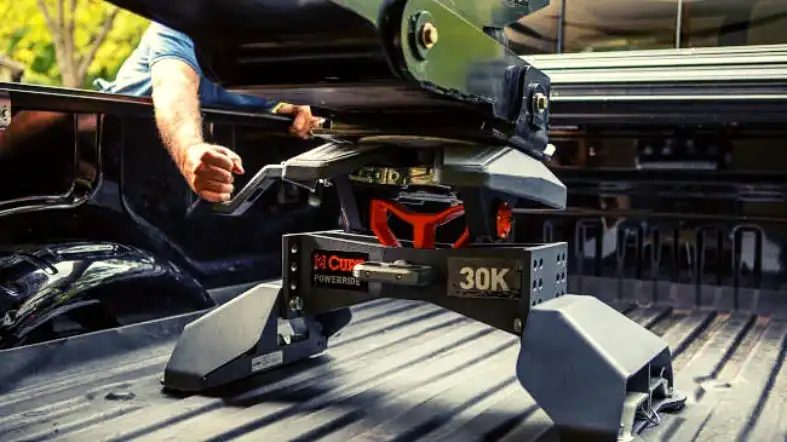
There are a few things you can do to ensure that your fifth wheel hitch is securely attached.
First, check the manual for your specific hitch to see if there are any special installation instructions.
Next, inspect all of the bolts and clamps to make sure they are tight.
Finally, test the hitch by pulling on it with your hands to make sure it does not move. If everything seems secure, then your hitch is likely installed correctly.
What are Some Common Problems with Fifth Wheel Hitches?
There are several problems that can occur with fifth wheel hitches. Some common problems include:
1. Fifth wheel hitches can become loose over time, causing the trailer to become disconnected from the truck.
2. The locking mechanisms on fifth wheel hitches can fail, causing the trailer to become disconnected from the truck.
3. Fifth wheel hitches can rust and corrode over time, making them less effective and more likely to fail.
4. Fifth wheel hitches can be damaged by road debris or other objects, which can cause them to fail.
What Should I Do if my Fifth Wheel Trailer Starts to Come Loose?
If you are towing a fifth wheel trailer and it starts to come loose, the first thing you should do is pull over to the side of the road.
If possible, find a level spot to park on so that you can safely inspect the situation.
Once you have stopped, take a look at the hitch to see if anything appears to be damaged or out of place.
If everything looks okay, then check all of the connections to make sure they are tight.
If everything is still coming loose, then you may need to adjust the tension on the fifth wheel hitch.
To do this, you will need to disconnect the trailer from the truck and then readjust the tension according to the manufacturer’s instructions.
Once you have done this, reconnect the trailer and try towing it again.
If it is still coming loose, then you may need to take it to a professional to have them take a look at it.
Do I Need to Install a Brake Controller When Towing a Fifth Wheel Trailer?
Yes, you will need to install a brake controller when towing a fifth wheel trailer.
This is because the extra weight of the trailer will require more braking power than your vehicle’s brakes can provide on their own.
A brake controller will give you the ability to apply the brakes on your trailer in a controlled manner, ensuring that you can stop safely even when hauling a heavy load.
Fifth wheel trailers typically have their own brakes, which are activated by the brake controller.
When installing a brake controller, be sure to follow the manufacturer’s instructions carefully so that you can properly operate it while on the road.
What Should I Do If My Fifth Wheel Trailer Starts To Sway?
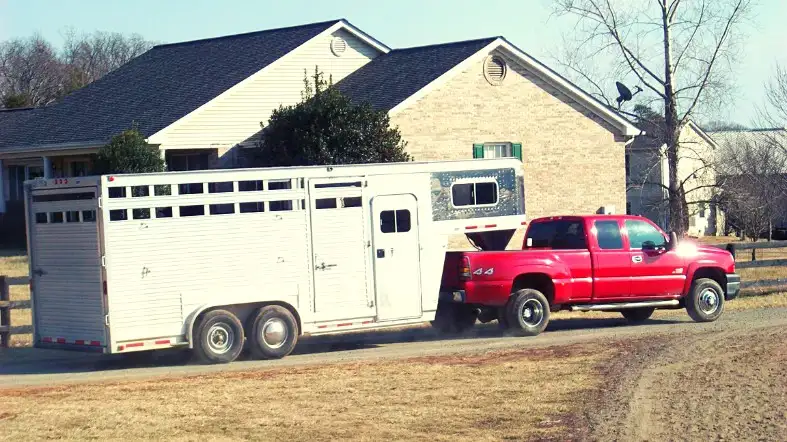
If you find that your fifth wheel trailer starts to sway while you’re driving, there are a few things you can do to try and correct the issue.
First, check to see if anything outside of the trailer is causing the problem.
If there is something blocking one of the wheels or preventing it from turning freely, that could be the cause.
Once you’ve ruled out any external factors, there are a few things you can do to adjust the trailer itself.
If the trailer is too heavy in one area, you can try redistributing the weight by moving items around inside.
If that doesn’t help, you may need to add weight to the tongue of the trailer. This will help keep it more stable on the road.
If you find that the trailer is still unstable, you may need to adjust the tension on the fifth wheel hitch.
You can do this by loosening or tightening the bolts that connect the hitch to the truck.
Once you’ve made any necessary adjustments, be sure to test the trailer again before hitting the road.
What Should I Do if my Fifth Wheel Hitch Becomes Stuck?
There are a few things you can do if your fifth wheel hitch becomes stuck.
You can first try to wiggle it back and forth to see if that will loosen it up.
If that doesn’t work, you can try hitting it with a mallet or a hammer to jar it loose.
If those two methods don’t work, you can try using a pry bar to leverage it.
Finally, if all else fails, you can cut the hitch free with a Sawzall or an oxyacetylene torch.
Or you can just call a tow truck and have them haul your rig out.
Just be sure to take some safety precautions if you go the Sawzall or torch route.
How Do I Lubricate my Fifth Wheel Hitch?
It’s important to keep your fifth wheel hitch properly lubricated in order to maintain its function and longevity.
Fortunately, this is a relatively easy task that can be accomplished by following these simple steps:
1. Begin by ensuring that the area around the hitch is clean and free of debris.
2. Next, apply a generous amount of lubricant to all moving parts of the hitch.
3. Once the lubricant has been applied, operate the hitch through its full range of motion a few times to help distribute it evenly.
4. Finally, wipe away any excess lubricant before re-installing the hitch on your vehicle.
Can I Paint my Fifth Wheel Hitch?
Whether or not you can paint your fifth-wheel hitch depends on the type of hitch you have.
If your hitch is made of steel, then painting it should be no problem.
However, if your hitch is made of aluminum, you’ll need to be careful about what type of paint you use. Some types of paint can actually damage aluminum surfaces.
Can I Mount my Fifth Wheel Hitch in the Bed of my Truck?
Yes, you can! In fact, fifth wheel hitches are designed to be mounted in the bed of a truck.
This way, they can distribute the weight of your trailer more evenly and provide better stability while you’re driving.
What Are Some Tips For Cleaning My Fifth Wheel Hitch?
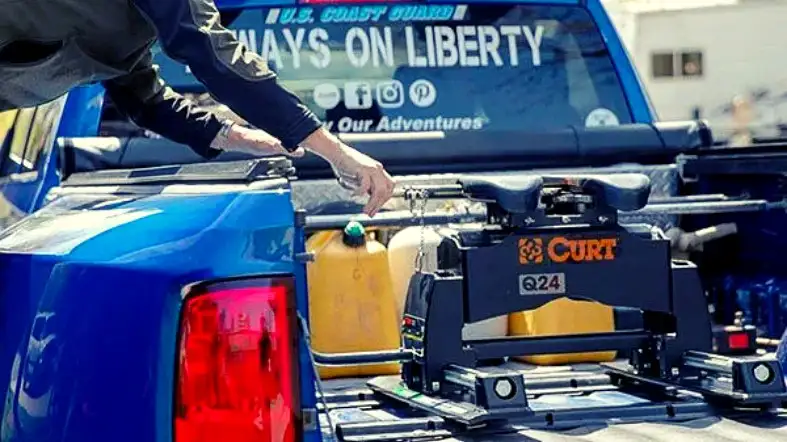
When it comes to keeping your fifth wheel hitch clean, there are a few key tips to follow.
First, regular cleaning and inspection of the hitch are important in order to keep it in good condition.
Secondly, if you notice any corrosion or damage on the hitch, be sure to have it repaired or replaced as soon as possible.
Lastly, always make sure to thoroughly clean and dry the hitch before storing it for extended periods of time.
How Do I Store my Fifth Wheel Hitch When Not in Use?
If you’re not using your fifth wheel hitch, it’s important to store it properly to keep it in good condition.
Here are some tips for storing your hitch:
1. If possible, store your hitch indoors in a dry and dust-free environment.
2. If storing your hitch outdoors, cover it with a tarp or similar material to protect it from the elements.
3. Inspect your hitch regularly for any signs of corrosion or damage.
If you see any damage, make sure to repair or replace it as soon as possible.
What are Some Tips for Backing up with a Fifth Wheel Hitch?
Backing up with a fifth wheel hitch can be tricky.
Here are some tips to make it easier:
1. Use a spotter
Whenever possible, have someone outside the vehicle to guide you as you back up.
This will make it easier to avoid obstacles and line up with your trailer.
2. Go slowly
Take your time when backing up, and don’t be afraid to stop and reposition yourself if needed.
3. Use your mirrors
Fifth wheel hitches can block your view of the trailer, so make sure to use your mirrors to see what’s behind you.
4. Practice in an empty parking lot
If you’re new to the fifth wheel hitch, it’s a good idea to practice backing up in an empty parking lot before taking it on the road.
How Do I Disconnect my Fifth Wheel Hitch?
When you’re ready to disconnect your fifth wheel hitch, there are a few things you’ll need to do.
First, make sure that your trailer is properly secured and the landing gear is lowered.
Next, you’ll need to release the locking jaws on the hitch head.
To do this, simply pull the red lever on the side of the hitch head.
Once the jaws are released, you can then slide the hitch head off of the kingpin.
Finally, lower your truck’s tailgate and remove any remaining parts of the hitch from your truck bed.
With these simple steps, you’ll have your fifth wheel hitch disconnected in no time!
What Should I Do if My Fifth Wheel Hitch is Damaged?
If your fifth wheel hitch is damaged, you will need to take some steps to ensure that it is repaired properly.
First, you will need to identify the source of the damage. If the damage is caused by a collision, you will need to have the hitch inspected by a qualified mechanic.
If the damage is caused by wear and tear, you may be able to repair it yourself.
Second, you will need to determine the extent of the damage.
If the damage is minor, you may be able to repair it yourself.
However, if the damage is major, you will need to have the hitch replaced.
Finally, you will need to decide whether or not you want to replace the entire hitch or just the damaged parts.
If you decide to replace the entire hitch, you will need to purchase a new one.
If you decide to replace just the damaged parts, you will need to find the appropriate replacement parts.
Once you have taken these steps, you will be able to get your fifth wheel hitch repaired and back in working order.
What Should I Do if I Lose my Fifth Wheel Pin or Clip?
If you lose your fifth wheel pin or clip, the first thing you should do is relax.
It may seem like a big deal, but it’s not the end of the world.
There are a few things you can do to replace it and get back on the road.
The first option is to visit a local RV dealer or retailer.
They should have replacement parts available and can help you install them.
If you’re not sure where to find one near you, try searching online or looking in your phone book.
Another option is to order a replacement pin or clip from an online retailer.
This can be a bit more expensive, but it’s often more convenient than dealing with a physical store.
Plus, you’ll have a wider selection to choose from.
Once you have your new pin or clip, make sure to keep it in a safe place!
You don’t want to lose it again.
It’s also a good idea to keep a spare on hand, just in case.
How Often Should I Inspect my Fifth Wheel Hitch?
It is important to inspect your fifth wheel hitch on a regular basis to ensure that it is in good working condition.
At a minimum, you should check it before each use.
A visual inspection will allow you to see if there are any cracks or other damage that could potentially cause problems.
If you notice any damage, it is best to replace the hitch rather than risk using it and having an accident.
What Happens if I Don’t Use my Fifth Wheel Hitch Regularly?
If you don’t use your fifth wheel hitch regularly, it’s important to keep it clean and lubricated to prevent rust and corrosion.
Additionally, you should check the manufacturer’s recommendations for storage and maintenance.
What Are Some Signs that my Fifth Wheel Hitch Needs to be Replaced?
It is important to regularly inspect your fifth wheel hitch to ensure that it is in good condition.
There are a few signs that may indicate that your hitch needs to be replaced, such as:
- If the hitch is cracked or damaged in any way, it should be replaced immediately.
- If the hitch is not properly secured to the vehicle, it can cause problems while driving.
- If the hitch is making noise or wobbling while in use, this could be a sign of wear and tear and should be inspected by a professional.
If you notice any of these issues with your fifth wheel hitch, it is best to replace it as soon as possible to avoid any potential problems.
Can I Rent a Fifth Wheel Hitch?
Yes, you can rent a fifth wheel hitch from many different companies.
Just make sure to get one that is compatible with your vehicle.
You will also need to have a receiver hitch installed on your vehicle in order to use the fifth wheel hitch.
If you don’t have a receiver hitch, most companies that rent fifth wheel hitches will also have receiver hitches available for rent.
Can I Buy a Used Fifth Wheel Hitch?
Just like any other hitch, a fifth wheel hitch can be bought new or used.
If you are considering buying a used hitch, there are a few things to keep in mind.
First, inspect the condition of the hitch.
Look for any signs of wear and tear, such as rusting or damage.
Second, make sure that the hitch is compatible with your vehicle.
If you are unsure, consult a professional to avoid any issues.
Third, check the price.
Used hitches can be found for a fraction of the cost of new ones, so be sure to shop around.
Who Makes the Best Fifth Wheel Hitch?
There are a few companies that make great fifth wheel hitches, but there is one in particular that stands out above the rest.
That company is Reese. Reese has been making hitches for years and they have a reputation for quality and durability.
Their hitches are also very easy to install and use, which is an important consideration when you’re choosing a hitch.
If you’re looking for a fifth wheel hitch, then Reese is the company you want to go with.
They make the best hitches on the market and they will give you peace of mind knowing that your trailer is safe and secure.
Here are some other great fifth wheel hitch brands to consider:
- Curt
- B&W
- Andersen
- RV Designer Collection
- Husky Towing Products
What is the Warranty on a Fifth Wheel Hitch?
The warranty on a fifth wheel hitch will vary depending on the manufacturer.
Some companies offer a limited lifetime warranty, while others may only offer a one or two year warranty.
Be sure to check with the manufacturer before making your purchase to find out what type of warranty is offered.
What is the Difference Between a Fifth Wheel Hitch and a Gooseneck Hitch?
The main differences between fifth wheel hitches and gooseneck hitches are in how they attach to the tow vehicle, and how much weight they can support.
Fifth wheel hitches attach to a special fifth wheel plate that is mounted over the rear axle of the tow vehicle.
Gooseneck hitches attach to a ball mount that is installed in the bed of the tow vehicle.
Fifth wheel hitches are typically able to support more weight than gooseneck hitches.
This is because the fifth wheel plate distributes the weight evenly over the rear axle of the tow vehicle, while a gooseneck hitch concentrates the weight on a single point.
If you’re looking for a hitch to tow a heavy trailer, then a fifth wheel hitch is the better option.
If you need a hitch that’s easier to install and remove, or if you need to be able to use your truck bed for other purposes when not towing, then a gooseneck hitch is the way to go.
What is the Difference Between a Fifth Wheel Hitch and a Conventional Trailer Hitch?
There are a few key differences between fifth wheel hitches and conventional trailer hitches, the most notable being the way in which they connect to the tow vehicle.
Fifth wheel hitches mount to the frame of the tow vehicle and utilize a kingpin connection, while conventional trailer hitches typically mount to the bumper and use a ball-and-socket connection.
The kingpin connection allows for a much sturdier connection between the fifth wheel hitch and the tow vehicle, which is important when hauling heavy loads.
The ball-and-socket connection used by conventional trailer hitches is not as strong, and is more susceptible to coming apart if not properly secured.
Another key difference between fifth wheel hitches and conventional trailer hitches is the way in which they distribute weight.
Fifth wheel hitches place the majority of the trailer’s weight over the rear axle of the tow vehicle, while conventional trailer hitches typically place more weight on the front axle.
What is the Difference Between a Fifth Wheel Hitch and a Weight Distribution Hitch?
The main differences between a fifth wheel hitch and a weight distribution hitch are in how they distribute the weight of the trailer, and how they are attached to the tow vehicle.
A fifth wheel hitch mounts to the bed of a pickup truck and uses a kingpin connection to attach to the trailer.
This type of hitch is typically used for heavier trailers, such as RVs.
The weight of the trailer is distributed evenly across the hitch, so it does not put too much strain on any one part of the truck.
A weight distribution hitch, on the other hand, attaches to the frame of the tow vehicle and uses chains or straps to distribute the weight of the trailer more evenly.
This type of hitch is typically used for lighter trailers, such as utility trailers.
The distribution of weight helps to keep the trailer from wobbling, and can also help to prevent the tow vehicle from being pulled down by the weight of the trailer.
Both types of hitches are designed to safely tow a trailer, but each has its own advantages and disadvantages.
It is important to choose the right hitch for the job, in order to ensure a safe and successful trip.
What is the Difference Between a Fifth Wheel Hitch and a Gooseneck Hitch Adapter?
The key differences between a fifth wheel hitch and a gooseneck hitch adapter are:
- A fifth wheel hitch is permanently installed in the bed of a truck, whereas a gooseneck hitch adapter can be removed when not in use.
- A fifth wheel hitch typically has a higher weight capacity than a gooseneck hitch adapter.
- A fifth wheel hitch allows for more control when making turns, whereas a gooseneck hitch adapter can be more difficult to maneuver.
- A fifth wheel hitch is typically more expensive than a gooseneck hitch adapter.
What is the Difference Between a Fifth Wheel Hitch and a Bumper Pull Hitch?
The main difference between a fifth wheel hitch and a bumper pull hitch is that a fifth wheel hitch mounts to the frame of the truck, while a bumper pulls hitch mounts to the rear bumper.
This makes the fifth wheel hitch much more stable since the weight is evenly distributed between the front and back of the vehicle.
However, this also means that fifth wheel hitches are more difficult to install and remove.
What is the Difference Between a Fifth Wheel Hitch and a Slide-In Camper Hitch?
The main difference between a fifth wheel hitch and a slide-in camper hitch is that the fifth wheel hitch is designed to be used with a trailer that has its own wheels, while the slide-in camper hitch is designed to be used with a trailer that does not have its own wheels.
This means that the fifth wheel hitch is better suited for use with larger trailers, while the slide-in camper hitch is better suited for use with smaller trailers.
Another difference between these two types of hitches is that the fifth wheel hitch typically has a higher weight capacity than the slide-in camper hitch.
What is the Difference Between a Fifth Wheel Hitch and a Toy Hauler Hitch?
The main difference between a fifth wheel hitch and a toy hauler hitch is that fifth wheel hitches are designed to be used with larger trailers (fifth wheels) while toy hauler hitches are designed for smaller trailers (toy haulers).
Fifth wheel hitches typically have a higher weight capacity and a more robust design, while toy hauler hitches are typically lighter and easier to maneuver.
Can I Use a Fifth Wheel Hitch with a Horse Trailer?
Yes, you can use a fifth wheel hitch with a horse trailer.
However, you will need to make sure that the fifth wheel hitch is properly installed and that the horse trailer is compatible with the fifth wheel hitch.
Can you tow a 5th wheel with a regular hitch?
The answer is technical yes, you can tow a 5th wheel with a regular hitch.
However, we do not recommend doing so.
5th wheels are much heavier than traditional trailers and put a lot of stress on the hitch.
This can cause problems down the road, such as decreased towing capacity and stability.
Can you tow a fifth wheel with a gooseneck hitch?
The answer is maybe. If your truck has the right towing capacity and you have the proper equipment, you may be able to tow a fifth wheel with a gooseneck hitch.
However, it is not recommended as it can be dangerous.
Which is better gooseneck or the 5th wheel hitch?
There is no simple answer to this question as there are pros and cons to both types of hitches.
A gooseneck hitch is typically easier to install and remove, and it offers a tighter turning radius than a 5th wheel hitch.
However, a 5th wheel hitch provides a more stable connection between the trailer and the tow vehicle, and it can accommodate heavier loads.
Ultimately, the best hitch for you depends on your specific needs and preferences.
If you frequently switch between trailers or tow different types of trailers (such as a fifth wheel trailer and a gooseneck trailer), then a gooseneck hitch might be the better choice.
On the other hand, if you primarily tow a fifth wheel trailer and you need to haul heavy loads, then a 5th wheel hitch is probably the better option.
Can you convert a fifth wheel hitch to a gooseneck?
Yes, you can convert a fifth wheel hitch to a gooseneck.
You will need to purchase a conversion kit, which typically includes an adapter plate and hardware.
Once the kit is installed, your fifth wheel hitch will be able to function as a gooseneck hitch.
What is one disadvantage of the fifth wheel hitch?
The fifth wheel hitch can be more expensive than other types of hitches.
It can also be more difficult to install.
Can you pull a fifth wheel with a bumper hitch?
No, a fifth wheel hitch is designed specifically for use with fifth wheel trailers. Bumper hitches are not compatible with fifth wheels.
Fifth wheels must be attached to a special hitch that is mounted in the bed of a pickup truck.
This type of hitch provides much more stability and towing capacity than a bumper hitch.
Does Ford make a fifth wheel hitch?
Yes, Ford does make a fifth wheel hitch.
The Ford fifth wheel hitch is available through the Ford Accessories Store.
You can find the hitch by searching for “fifth wheel hitch” on the website.
The hitch comes with all of the necessary installation hardware and instructions.
What is the average cost of a fifth wheel hitch?
The average cost of a fifth wheel hitch is between $200 and $300.
However, prices can vary depending on the brand, model, and features.
Some higher-end models can cost over $1,000.
How much is a sliding fifth wheel hitch?
A sliding fifth wheel hitch typically costs between $250 and $500.
Higher-end models can cost up to $1,000.
If you are towing a fifth-wheel trailer, you will need a fifth-wheel hitch.
These hitches are designed specifically for trailers with a fifth-wheel configuration, and they offer a number of advantages over other types of hitches.
Finally, we answered all of the questions about fifth-wheel hitch.
If you have any other questions, feel free to contact us.
